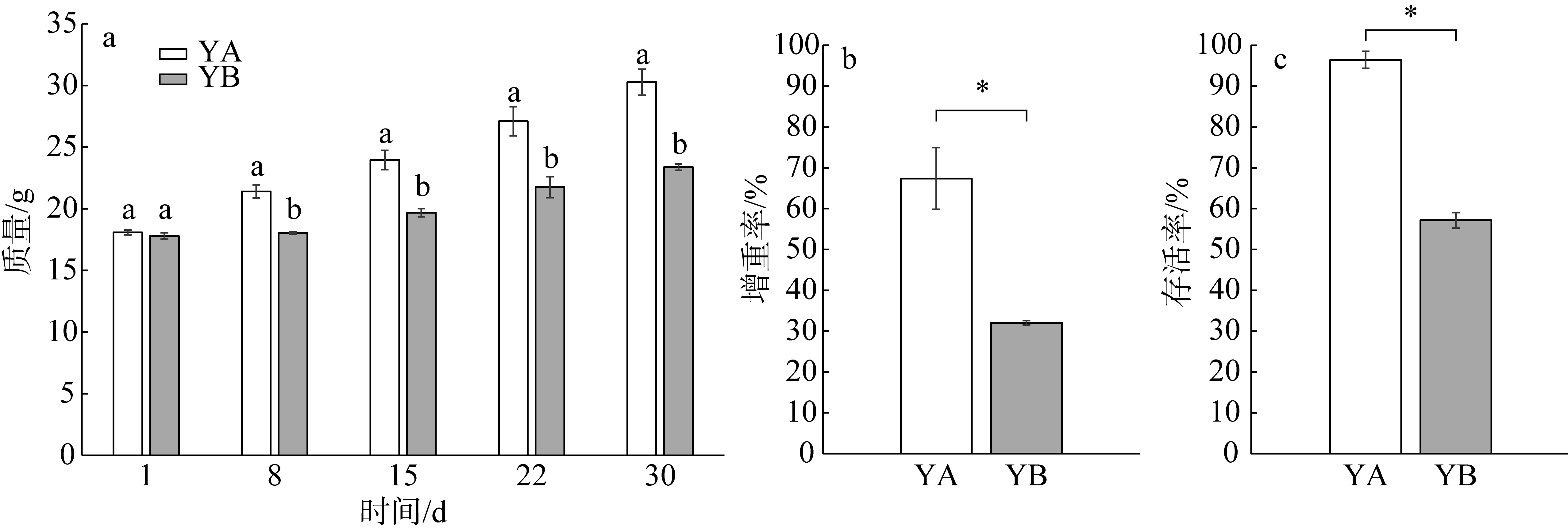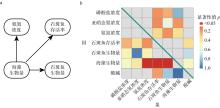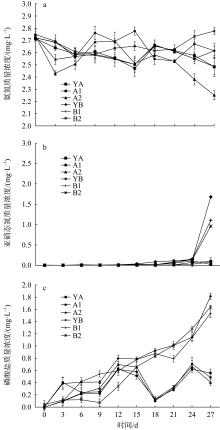Journal of Tropical Oceanography ›› 2025, Vol. 44 ›› Issue (2): 147-156.doi: 10.11978/2024086CSTR: 32234.14.2024086
• Marine Biology • Previous Articles Next Articles
Algae-fish interactions and wastewater quality control in recirculating aquaculture systems
GUO Youyou1( ), XIE Enyi1, XIN Rong1, LIN Kun1, LIAO Jiawei1, CHEN Chunli1, WANG Huihui1, YANG Wencheng1, CUI Jianjun1(
), XIE Enyi1, XIN Rong1, LIN Kun1, LIAO Jiawei1, CHEN Chunli1, WANG Huihui1, YANG Wencheng1, CUI Jianjun1( ), MO Feng2, WEN Qijiao2
), MO Feng2, WEN Qijiao2
- 1. Fisheries College of Guangdong Ocean University, Zhanjiang 524088, China
2. Lianjiang Shrimp Farming Group Limited, Zhanjiang 524499, China
-
Received:2024-04-15Revised:2024-06-10Online:2025-03-10Published:2025-04-11 -
Contact:CUI Jianjun -
Supported by:National Key Research and Development Program of China(2022YFD2401303); Technical Service(B23315)
CLC Number:
- P735.124
Cite this article
GUO Youyou, XIE Enyi, XIN Rong, LIN Kun, LIAO Jiawei, CHEN Chunli, WANG Huihui, YANG Wencheng, CUI Jianjun, MO Feng, WEN Qijiao. Algae-fish interactions and wastewater quality control in recirculating aquaculture systems[J].Journal of Tropical Oceanography, 2025, 44(2): 147-156.
share this article
Add to citation manager EndNote|Reference Manager|ProCite|BibTeX|RefWorks

Fig. 1
Schematic diagram of aquaculture recirculation system 1. Sandy substrate; 2. Outlet filter screen; 3. Water speed regulating valve; 4. Anti overflow port; 5. Water pump. YA/YB are grouper breeding buckets; A1/B1 is the aquaculture water tank connected to the YA/YB outlet; A2/B2 is the aquaculture water tank connected to A1/B2"


Fig. 3
Variation of survival rate and growth performance in Pearl Gentian Grouper. (a) weight; (b) weight gain rate; (c) survival rate A bar chart with the same letters indicates that two sets of data belong to the same proton set, indicating that there is no significant difference between these groups. A bar chart with an asterisk (*) indicates a significant difference in the mean values between groups (p<0.05)"


Fig. 4
Variation of the growth indexes of Gracilaria spp.. (a) wet weight; (b) specific growth rate; (c) weight gain rate A bar chart with the same letters indicates that two sets of data belong to the same proton set, indicating that there is no significant difference between these groups. A bar chart with an asterisk (*) indicates a significant difference in the mean values between groups (p<0.05)"


Fig. 5
Granger causality test-based analysis of variable causal relationships and significance. (a) The direction of the arrows indicates causal relationships between variables, with arrows pointing from the causal variable to the resultant variable. (b) The heatmap shows the significance p-values of the Granger causality test. When p < 0.05, the variable on the left is considered the cause of the variable at the bottom"

| [1] |
陈素文, 陈利雄, 朱长波, 等, 2014. 环境因子对海萝藻体生长及成活的影响[J]. 南方水产科学, 10(3): 92-96.
|
|
|
|
| [2] |
葛长字, 2006. 大型海藻在海水养殖系统中的生物净化作用[J]. 渔业现代化, (4): 11-13.
|
|
|
|
| [3] |
郜晓峰, 刘炜, 钟逸云, 等, 2022. 不同温度对大叶藻生长与光合生理的影响[J]. 应用与环境生物学报, 28(1): 175-181.
|
|
|
|
| [4] |
黄鹤忠, 梁建生, 张群英, 2013. 菊花江蓠 (Gracilaria lichenoides) 对N、P吸收效应及其细胞超微结构变化[J]. 海洋与湖沼, 44(1): 95-102.
|
|
|
|
| [5] |
黄永健, 崔建军, 陈心怡, 等, 2023. 异枝江蓠对温度和光照强度的光合生理响应[J]. 南方水产科学, 19(4): 139-147.
|
|
|
|
| [6] |
柯瑞林, 任黎华, 孟顺龙, 2023. 水产养殖尾水处理技术研究进展[J]. 中国农学通报, 39(29): 146-151.
doi: 10.11924/j.issn.1000-6850.casb2022-0883 |
|
doi: 10.11924/j.issn.1000-6850.casb2022-0883 |
|
| [7] |
孔凡文, 才旭, 于淼, 2010. 格兰杰因果关系检验模型分析与应用[J]. 沈阳建筑大学学报(自然科学版), 26(2): 405-408.
|
|
|
|
| [8] |
李华, 田道贺, 刘青松, 等, 2021. 长茎葡萄蕨藻在模拟工厂化循环水养殖环境中的脱氮研究[J]. 生态科学, 40(5): 59-68.
|
|
|
|
| [9] |
李豫, 黄建盛, 陈有铭, 等, 2023. 低温胁迫对军曹鱼幼鱼鳃组织抗氧化能力、细胞凋亡和组织结构的影响[J]. 南方水产科学, 19(3): 68-77.
|
|
|
|
| [10] |
李再亮, 申玉春, 刘丽, 等, 2014. 半叶马尾藻对N、P吸收速率的初步研究[J]. 广东海洋大学学报, 34(4): 9-13.
|
|
|
|
| [11] |
李志凌, 王晓龙, 田相利, 等, 2018. 珍珠龙胆石斑鱼与不同海水植物工厂化原位混养的比较研究[J]. 海洋湖沼通报, 5: 118-124.
|
|
|
|
| [12] |
廖秀睿, 李曦, 柳睿杰, 等, 2021. 曲褶刚毛藻在对虾养殖尾水无机氮盐净化中的应用[J]. 海南热带海洋学院学报, 28(2): 1-5.
|
|
|
|
| [13] |
林向阳, 钟晨辉, 唐隆晨, 等, 2018. 海带对大黄鱼网箱养殖区水质的生物修复[J]. 渔业研究, 40(4): 279-285.
|
|
|
|
| [14] |
刘义豪, 刘相全, 徐英江, 等, 2020. 光照和盐度对江蓠在N、P持续加富条件下生长和吸收的影响[J]. 海洋湖沼通报, (5): 88-94.
|
|
|
|
| [15] |
尚志刚, 沈晓阳, 李蒙蒙, 等, 2020. 基于格兰杰因果的效应性连接分析方法综述[J]. 郑州大学学报(工学版), 41(3): 1-7, 13.
|
|
|
|
| [16] |
孙晓飞, 花勃, 2017. 室内工厂化循环水立体养殖锯缘青蟹技术[J]. 中国水产, (5): 80-82. (in Chinese).
|
| [17] |
汤坤贤, 焦念志, 游秀萍, 等, 2005. 菊花心江蓠在网箱养殖区的生物修复作用[J]. 中国水产科学, 12(2): 156-161.
|
|
|
|
| [18] |
王成强, 相智巍, 黄炳山, 等, 2022. 3种耐盐植物对水产养殖废水净化效果[J]. 广东海洋大学学报, 42(3): 25-32.
|
|
|
|
| [19] |
王峰, 雷霁霖, 高淳仁, 等, 2013. 国内外工厂化循环水养殖模式水质处理研究进展[J]. 中国工程科学, 15(10): 16-23, 32.
|
|
|
|
| [20] |
王丽娜, 申玉春, 叶宁, 等, 2017. 养殖密度对珍珠龙胆石斑鱼行为活动和生长性能的影响[J]. 南方农业学报, 48(5): 920-925.
|
|
|
|
| [21] |
王晓艳, 李宝山, 王际英, 等, 2021. 江蓠和四角蛤蜊对珍珠龙胆石斑鱼封闭养殖水体水质的净化作用[J]. 烟台大学学报(自然科学与工程版), 34(2): 186-193.
|
|
|
|
| [22] |
温珊珊, 2008. 真江蓠对养殖水体的生态修复研究[D]. 上海: 上海海洋大学.
|
|
|
|
| [23] |
温珊珊, 张寒野, 何文辉, 等, 2008. 真江蓠对氨氮去除效率与吸收动力学研究[J]. 水产学报, 32(5): 794-803.
|
|
|
|
| [24] |
翁祖兴, 2023. 赤点石斑鱼工厂化循环水养殖试验[J]. 科学养鱼, (9): 70-72.
|
|
|
|
| [25] |
吴超元, 李纫芷, 林光恒, 等, 1994. 细基江蓠繁枝变型生长适宜环境条件的研究[J]. 海洋与湖沼, 25(1): 60-66.
|
|
|
|
| [26] |
吴雯艳, 邵一涵, 叶雯雯, 等, 2021. 工厂化循环水养殖对虾研究进展[J]. 水产养殖, 42(7): 18-22.
|
|
|
|
| [27] |
徐永健, 陆开宏, 韦玮, 2007a. 大型海藻江蓠对养殖池塘水质污染修复的研究[J]. 中国生态农业学报, 15(5): 156-159.
|
|
|
|
| [28] |
徐永健, 韦玮, 钱鲁闽, 2007b. 菊花江蓠对陆基围隔高密度对虾养殖的污染净化与水质调控[J]. 中国水产科学, 14(3): 430-435.
|
|
|
|
| [29] |
徐皓, 张建华, 丁建乐, 等, 2010. 国内外渔业装备与工程技术研究进展综述[J]. 渔业现代化, 37(2): 1-8.
|
|
|
|
| [30] |
杨凤, 马燕武, 张东升, 等, 2003. 孔石莼和臭氧对养鲍水质的调控作用比较[J]. 大连水产学院学报, 18(2): 79-83.
|
|
|
|
| [31] |
杨宇峰, 费修绠, 2003. 大型海藻对富营养化海水养殖区生物修复的研究与展望[J]. 青岛海洋大学学报, 33(1): 53-57.
|
|
|
|
| [32] |
岳维忠, 黄小平, 黄良民, 等, 2004. 大型藻类净化养殖水体的初步研究[J]. 海洋环境科学, 23(1): 13-15, 40.
|
|
|
|
| [33] |
张胜花, 常军军, 孙珮石, 2013. 水体藻类磷代谢及藻体磷矿化研究进展[J]. 生态环境学报, 22(7): 1250-1254.
|
|
|
|
| [34] |
张文香, 王志敏, 张卫国, 2005. 海水鱼类工厂化养殖的现状与发展趋势[J]. 水产科学, 24(5): 50-52.
|
|
|
|
| [35] |
赵崇宇, 蔡岩, 朱力, 等, 2023. 大型海藻对方斑东风螺养殖尾水净化效果比较[J]. 海南大学学报(自然科学版), 41(4): 359-368.
|
|
|
|
| [36] |
郑辉, 许文超, 2016. 4种海藻在南美白对虾养殖水体中的生态作用[J]. 河南农业科学, 45(5): 144-147.
|
|
|
|
| [37] |
郑辉, 2018. 大型海藻对水产养殖废水中无机氮和活性磷酸盐吸收作用研究[J]. 科技通报, 38(4): 258-261.
|
|
|
|
| [38] |
钟志海, 黄中坚, 陈伟洲, 2014. 不同环境因子对异枝江蓠的生长及生化组分的影响[J]. 渔业科学进展, 35(3): 98-104.
|
|
|
|
| [39] |
|
| [40] |
|
| [41] |
|
| [42] |
|
| [43] |
|
| [44] |
|
| [45] |
|
| [46] |
|
| [47] |
|
| [48] |
|
| [1] | CHEN Jingfu, ZHONG Yu, WANG Lei, GUO Yupei, QIU Dajun. Noctiluca scintillans effects on eukaryotic plankton community structure using Environmental DNA analysis in Daya Bay* [J]. Journal of Tropical Oceanography, 2022, 41(5): 121-132. |
| [2] | LI Kaizhi, KE Zhixin, WANG Junxing, TAN Yehui. Preliminary study on the community structure of zooplankton in coral reef waters of Xisha Islands* [J]. Journal of Tropical Oceanography, 2022, 41(2): 121-131. |
| [3] | LI Li-hao,YU Da-hui,HUANG Gui-ju,DU Bo,FU Yun,TONG Xin,GUO Yi-hui,YE Wei. Comparison of genetic diversity among stocks of Oreochromis niloticus, O. aureus and red tilapia based on microsatellite DNA [J]. Journal of Tropical Oceanography, 2012, 31(2): 102-109. |
|
||



